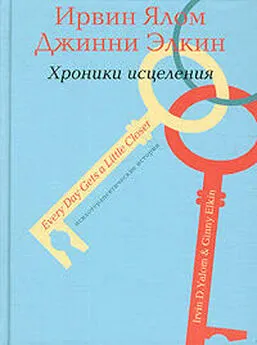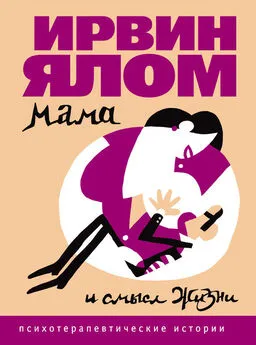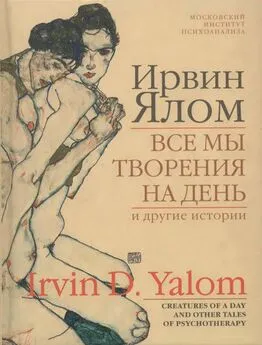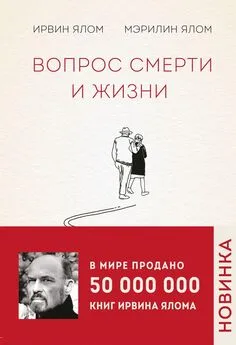Ирвин Ялом - The Schopenhauer Cure
- Название:The Schopenhauer Cure
- Автор:
- Жанр:
- Издательство:неизвестно
- Год:неизвестен
- ISBN:нет данных
- Рейтинг:
- Избранное:Добавить в избранное
-
Отзывы:
-
Ваша оценка:
Ирвин Ялом - The Schopenhauer Cure краткое содержание
The Schopenhauer Cure - читать онлайн бесплатно полную версию (весь текст целиком)
Интервал:
Закладка:
he`s got a point. A good one.
«So, at the end of the session he asked for a ride to the bus terminal, and before I
could answer, Rose said she wouldn`t feel safe in the same car with him. вЂGot it,` he said,
and walked away, lugging his suitcase.
«Well, ten minutes later Rose and I were driving down Market Street, and I see
him—a white–haired, stooped old man pulling his suitcase. It was starting to rain, and I
say to myself, вЂThis is the shits.` I lost it and told Rose, вЂHe comes here for you—for
your therapy session—he comes all the way from Portland, it`s raining, and goddamnit
I`m taking him to the bus station.` I pulled over to the curb and offered him a lift. Rose
stares daggers at me. вЂIf he gets in, I get out,` she says. I say, вЂBe my guest.` I point to
Starbucks on the street and tell her to wait there and I`ll come back in a few minutes. She
gets out and stalks off. That was about five hours ago. She never did show up at
Starbucks. I drove over to Golden Gate Park and been walking around since. I`m thinking
of never going home.»
With that, Gill flopped back in his chair, exhausted.
The members—Tony, Rebecca, Bonnie, and Stuart—broke out into a chorus of
approval: «Great, Gill.» «About time, Gill.» «Wow, you really did it.» «Whoa, good
move.» Tony said, «I can`t tell you how glad I am that you tore yourself loose from that
bitch.» «If you need a bed,” said Bonnie, nervously running her hands through her frizzy
brown hair and adjusting her goggle–shaped, yellow–tinted spectacles, «I`ve got a spare
room. Don`t worry, you`re safe,” she added with a giggle, «I`m far too old for you and
my daughter`s home.»
Julius, not happy with the pressure the group was applying (he had seen too many
members drop out of too many therapy groups because they were ashamed of
disappointing the group), made his first intervention, «Strong feedback you`re getting,
Gill. How do you feel about it?»
«Great. It feels great. Only I...I don`t want to disappoint everybody. This is
happening so fast—this all just happened this morning...I`m shaky and I`m fluid...don`t
know what I`m going to do.»
«You mean,” said Julius, «you don`t want to substitute your wife`s imperatives
with the group`s imperatives.»
«Yeah. I guess. Yeah, I see what you mean. Right. But it`s a mixed bag. I really
want, really really need this encouragement...grateful for it...I need guidance—this may
be a turning point in my life. Heard from everyone but you, Julius. And of course from
our new member. Philip, is it?»
Philip nodded.
«Philip, I know you don`t know about my situation, butyou do.» Gill turned to face
Julius. «What about it? What doyou think I should do?»
Julius involuntarily flinched and hoped it had not been visible. Like most
therapists, he hated that question—the «damned if you do, damned if you don`t» question.
He had seen it coming.
«Gill, you`re not going to like my answer. But here it is. I can`t tell you what to do:
that`s your job, your decision, not mine. One reason you`re here in this group is to learn
to trust your own judgment. Another reason is that everything I know about Rose and
your marriage has come to me through you. And you can`t avoid giving me biased
information. What I can do is help you focus on how you contribute to your life
predicament. We can`t understand or change Rose; it`syou —your feelings, your
behavior—that`s what counts here becausethat`s what you can change.»
The group fell silent. Julius was right; Gill did not like that answer. Neither did the
other members.
Rebecca, who had taken out two barrettes and was flouncing her long black hair
before replacing them, broke the silence by turning to Philip. «You`re new here and don`t
know the backstory that the rest of us know. But sometimes from the mouth of newborn
babes....»
Philip sat silent. It was unclear whether he had even heard Rebecca.
«Yeah, you have a take on this, Philip?» said Tony, in what was, for him, an
unusually gentle tone. Tony was a swarthy man with deep acne scars on his cheeks and a
lean, graceful athletic body exhibited to good advantage in his black San Francisco
Giants T–shirt and tight jeans.
«I have an observation and a piece of advice,” said Philip, hands folded, head tilted
back, and eyes fixed on the ceiling. «Nietzsche once wrote that a major difference
between man and the cow was that the cow knew how to exist, how to live without
angst—that is,fear —in the blessed now, unburdened by the past and unaware of the
terrors of the future. But we unfortunate humans are so haunted by the past and future
that we can only saunter briefly in the now. Do you know why we so yearn for the golden
days of childhood? Nietzsche tells us it`s because those childhood days were the carefree
days, daysfree of care, days before we were weighted down by leaden, painful memories,
by the debris of the past. Allow me to make one marginal note: I refer to a Nietzsche
essay, but this thought was not original—in this, as in so much else, he looted the works
of Schopenhauer.»
He paused. A loud silence rang out in the group. Julius squirmed in his chair,
thinking, Oh shit, I must have been out of my fucking mind to bring this guy here. This is
the goddamnedest, most bizarre way I`ve ever seen a patient come into a group.
Bonnie broke the silence. Turning her gaze squarely upon him, she said, «That`s
fascinating, Philip. I know I keep yearning for my childhood, but I never understood it
that way, that childhood feels free and golden because there`s no past to weigh you down.
Thanks, I`m going to remember that.»
«Me too. Interesting stuff,” said Gill. «But you said you had advice for me?»
«Yes, here`s my advice.» Philip spoke evenly, softly, still making no eye contact.
«Your wife is one of those people who is particularly unable to live in the present because
she is so heavily laden with the freight of the past. She is a sinking ship. She`s going
down. My advice to you is to jump overboard and start swimming. She`ll produce a
powerful wake when she goes under, so I urge you to swim away as fast and as hard as
you can.»
Silence. The group seemed stunned.
«Hey, no one is going to accuse you,” said Gill, «of pulling your punches. I asked a
question. You gave an answer. I appreciate that. A lot. Welcome to the group. Any other
comments you got—I want to hear them.»
«Well,” said Philip, still looking upward, «in that case let me add one additional
thought. Kierkegaard described some individuals as being in вЂdouble despair,` that is,
they are in despair but too self–deceived to know even that they are in despair. I think you
may be in double despair. Here`s what I mean: most of my own suffering is a result of
my being driven by desires, and then, once I satisfy a desire, I enjoy a moment of
satiation, which soon is transformed into boredom, which is then interrupted by another
desire springing up. Schopenhauer felt this was the universal human condition—wanting,
momentary satiation, boredom, further wanting.
«Back to you—I question whether you`ve yet explored this cycle of endless desires
within yourself. Perhaps you`ve been so preoccupied with your wife`s wishes it`s kept
you from becoming acquainted with your own desires? Isn`t that why others here were
applauding you today? Wasn`t it because you were finally refusing to be defined by her
wishes? In other words, I`m asking whether your work on yourself has been delayed or
derailed by your preoccupation with your wife`s wishes.»
Gill listened, mouth gaping, gaze fixed on Philip. «That`s deep. I know there`s
something deep and important in what you`re saying—in this double despair idea—but
I`m not getting it all.»
All eyes were now on Philip, who continued to have eyes only for the ceiling.
«Philip,” said Rebecca, now finished with replacing her barrettes, «weren`t you saying
that Gill`s personal work won`t really begin until he liberates himself from his wife?»
«Or,” Tony said, «that his involvement with her prevents him from knowing how
fucked–up he really is? Hell, I know this is true for me and the way I relate to my work—
I been thinking this past week that I`m so busy being ashamed of being a carpenter—
being blue–collar, being low–income, being looked down on—that I never get around to
thinking about the real shit I should be dealing with.»
Julius watched in amazement as others, thirsty for Philip`s every word, chimed in.
He felt competitive urges rising but quelled them by reminding himself that the group`s
purposes were being served.Cool it, Julius, he said to himself,the group needs you;
they`re not going to desert you for Philip. What`s going on here is great; they are
assimilating the new member, and they are also each laying out agendas for future work.
He had planned to talk about his diagnosis in the group today. In a sense his hand
was now forced because he had already told Philip he had a melanoma and, to avoid the
impression of a special relationship with him, had to share it with the whole group. But
he had been preempted. First there was Gill`s emergency, and then there was the group`s
total fascination with Philip. He checked the clock. Ten minutes left. Not enough time to
lay this on them. Julius resolved that he would absolutely begin the next meeting with the
bad news. He remained silent and let the clock run out.
12
1799—Arthur
Learns about
Choice and
Other Worldly
Horrors
_________________________
Thekings left their crowns and
scepters behind here, and the
heroes their weapons. Yet the
great spirits among them all,
whose splendor flowed out of
themselves, who did not
receive it from outward
things, they take their
greatness across with them.
—Arthur Schopenhauer, age sixteen at
Westminster Abbey
_________________________
When the nine–year–old Arthur returned from Le Havre, his father placed him in a private
school whose specific mandate was to educate future merchants. There he learned what
good merchants of the time had to know: to calculate in different currencies, to write
business letters in all the major European languages, to study transport routes, trade
centers, yields of the soil, and other such fascinating topics. But Arthur was not
fascinated; he had no interest in such knowledge, formed no close friendships at school,
and dreaded more each day his father`s plan for his future—a seven–year apprenticeship
with a local business magnate.
What did Arthur want? Not the life of a merchant—he loathed the very idea. He
craved the life of a scholar. Though many of his classmates also disliked the thought of a
long apprenticeship, Arthur`s protests ran far deeper. Despite his parents` strong
admonitions—a letter from his mother instructed him to «put aside all these authors for a
while...you are now fifteen and have already read and studied the best German, French
and, in part, also English authors»—he spent all his available free time studying literature
Читать дальшеИнтервал:
Закладка:









